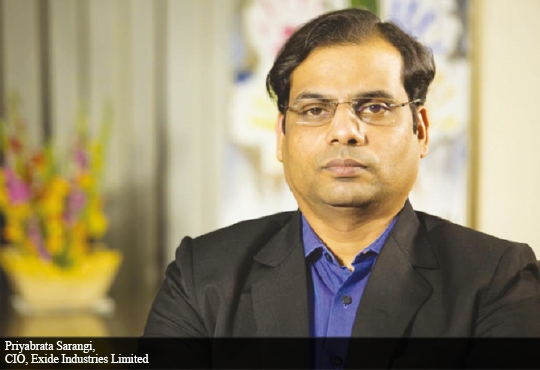
IoT Playing its Part in Make in India
Joseph Kiran Kumar, Head- IT, Eisai Pharmaceuticals India | Monday, 03 July 2017, 09:40 IST
 We have come a long way in the industrial revolution from steam engine, the conveyor belt, and the first phase of IT to the Internet of Things (IoT) induced Industrial revolution now known as Industry 4.0.
We have come a long way in the industrial revolution from steam engine, the conveyor belt, and the first phase of IT to the Internet of Things (IoT) induced Industrial revolution now known as Industry 4.0.
Almost simultaneously India is embarking upon “Make in India” program which attempts to bring Indian manufacturing to the world stage. There is great expectation on “Make in India” campaign which is aimed at putting India on the global stage of manufacturing through technology supported manufacturing. IoT is changing many things around us and manufacturing is not an exception. Manufacturing plants that are connected to the Internet are more efficient and productive compared to their counterpart. At time when Indian manufacturers are looking for presence in the International market and future leadership these critical elements of IoT would give them competitive advantage. IoT gives the companies a serious advantage of connectivity especially for those who have global operations and also to those who intend to go global. IoT neutralizes challenges that exist in the form of inefficiencies in the systems, workforce and brings forth new business opportunities. IoT helps the companies to gain complete visibility across production process, connect production to core business processes and supports custom manufacturing focusing on customer needs.
Management of Production Lines
Production lines are another area of challenge for the companies where the companies would like have an online status of production. Any kind of deviation from the standard process would be attended to immediately before it results in any losses due to product problems. Sensors in the assembly line connected to various terminals can instantly find out the status of the production and relay that information to the managers & other important members of the organization. IoT promises to eliminate massive information gaps that exist on the shop floor that would have been impossible to address in the past.
Companies can control and manage the equipment and instruments from remote locations. A company can control operations of the production unit in a far away Baddi, Himachal Pradesh from their office in Bangalore.
Safer Work Places
Safe work environment is the paramount for any manufacturing company. While many Indian manufacturers comply with management and quality standards a lot is desired in this space as some of the conditions in the manufacturing area are of hazardous in nature. Most of the hazards such as in chemical handling, reactor management etc. can be handled smartly through IoT thus making the workplace safer for employees.
Challenges With IoT
Manufacturers have to weigh in the risks that come with IoT, especially the exposed protocols, interfaces, firmware, software and authentication controls. Any let off on these would bring in catastrophic results for the company.
IoT enabled manufacturing will make logistics and suppliers stretch quite a bit. Supporting supply chain systems haven’t still scaled up to support the changes that IoT’s are going to bring. Lean manufacturing can certainly reduce inventories; there should be an equivalent implementation of IoT in Supply chain to realize the benefits that IoT can provide to the companies.
There would be a strong need for Information flow to be synchronized with the material flow as the line between these flows would blur as the products would be intertwined to the information. In case of custom manufacturing the raw and the semi-finished materials would carry all the information about the customer to whom the finished product is going to and subsequent activities shall be planned accordingly. IT would be in the middle of the scheme as it connects the machines, production components and the manufacturing environment.
Conclusion
"Process and device" will be inseparable; physical things become part of the process.
To get any value out of data, that data first needs to be gathered. Indian manufacturers could deploy instruments such as sensors and controllers or even smart, networked cameras or RFID readers to measure a wide range of operational processes. These components should be both made accessible and affordable across their value chains—in the plant, warehouse, extended supply chain, and the customer. Manufacturers will need to nurse the skilled talent to get the maximum out of the ecosystem. Training staff and constantly looking for the right talent is a critical success factor besides the speed of IoT adaptation.
As the visionaries in India promote “Make in India” the early adaptation of IoT by the Indian manufacturers would propel them into the world stage with quality products for global consumption. At the same time IoT would also help the manufacturers to build efficiencies in the system to continuously improve product and process quality. Make in India would put India on a big stage of industry 4.0 and would help the nation realize the dream of contribution to the world through manufacturing.
CIO Viewpoint
By Priyabrata Sarangi, CIO, Exide Industries Limited
Smart Homes: Not Too Distant Reality
By Amit Bhatia, CIO, Jaquar Group
By Aniruddha Mehta, Head Qa-It, Alembic Pharmaceuticals Limited
CXO Insights
Home Owners Can Look Forward To Futuristic Home...
By Avnish Mehta, Director - Digital Transformation at CollaberaInc
Empowering Mobile Network Operators With...
By Christos Karmis, President & CEO, Mobilitie
Smart Homes: Changing The Way We Live








